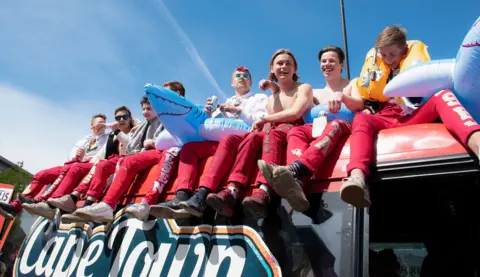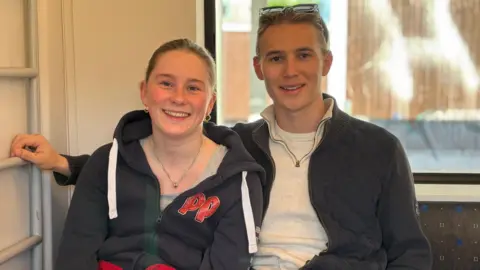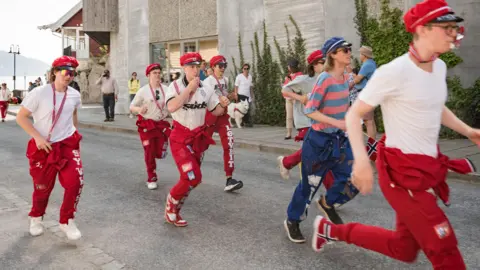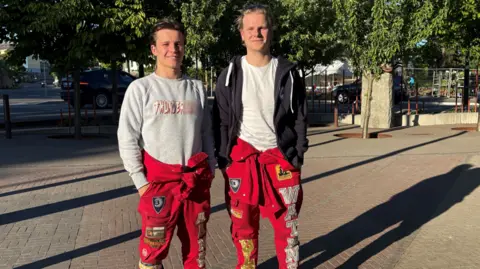School leavers party for weeks on midnight buses, and Norway says it's gone too far
 Shutterstock
ShutterstockAfter 13 years of school, Selma Jenvin-Steinsvag and her classmate Aksel were running to catch the Oslo metro in red overalls. "After that all our written exams will be done," said Selma, 18.
The sight of school-leavers, known here as russ, walking around in colourful overalls is something of a coming-of-age tradition that brightens up the weeks before Norway's national day on 17 May.
That marks the day the russ can finally relax after their exams and have one final party. But for increasing numbers of young Norwegians, the parties have been starting weeks earlier, well before their exams have finished.

And there is one side to the celebrations that has increasingly alarmed parents and politicians alike - the russebuss.
"It's a party bus! We go out every night for a month, we get drunk, we're partying with our friends and it's just fun!" says 19-year-old Edvard Aanestad, who is finishing school on the west side of Oslo.
The fear is that all the weeks of partying as well as the peer pressure involved are having a detrimental effect on teenagers' overall wellbeing, as well as their grades.
A small fortune is often spent renting the buses and decking them out and many school-leavers go into debt to pay for it all.
"A russebuss drives all night from around midnight until early morning. We play really, really loud music and party all night," says Edvard's friend, Henrik Wathne, who's 18.
Alongside all the fun, there have been complaints that the celebrations result in heavy drinking, drug use and little sleep. There are also concerns that many teenagers feel left out because they cannot afford the cost.
And all of it currently coincides with the exam period.
 Alamy
AlamyPrime Minister Jonas Gahr Store said last year that he too had enjoyed his graduation, but the party bus culture had spun out of control.
His intervention followed years of public debate, with objections from authorities as well as many of the school-leavers and their parents.
"We are worried about some negative trends in our schools and neighbourhoods, and within Norwegian youth culture in general," says Solveig Haukenes Aase, whose eldest child is graduating this year.
Her two younger children are yet to start high school and she complains that the culture affects younger teenagers too: "In recent years, it has also started to have an impact on middle school kids."
Together with other parents she formed a group aimed at making the environment for young people safer.
"The attitude of school authorities previously was that it's a private matter, that the russefeiring (celebration) is something that happens in your spare time," she told the BBC.
"But there has been a change in mentality among teachers, principals and school authorities, and it's now widely acknowledged that the new russe culture has a huge impact on the school environment."

Norway's minister of education, Kari Nessa Nordtun, said it had been "a problem for many years that the celebrations and the exam period have been intertwined".
She told the BBC that school-leavers had experienced difficulties in concentrating on exams because of the partying and that results had declined because of it.
"The celebration has also become highly commercialised and exclusionary, and we see that these negative effects are spreading all the way down to lower secondary school.
"We want to put an end to social exclusion, peer pressure and high costs for many young people. We are now working to create a new and more inclusive graduation celebration."
The plan now is to ensure that from next year celebrations are moved to the post-exam period.
Listen: Advice to a Norwegian daughter before russefeiring
The party bus tradition dates back to Oslo in the early 1980s and tends to be more prevalent among some of the more elite schools.
But it has now become national in scale and Ivar Brandvol, who has written about the tradition, believes the whole point of the bus has now changed, so that the bus celebrations no longer involve the whole school class but a more select group instead.
"Another change is the amount of money you need to be a part of a bus-group. Some of the bus-groups will have a budget up to 3m krone (£220,000) even if they choose to just rent it," he says.
"Sound-systems are shipped from all over Europe. To pay the bills, the groups will often sell toilet paper to friends, family and neighbours for a little profit. But the kids have to sell tons of toilet paper to earn enough, and usually end up using savings and getting into debt."

There is a broad acceptance in Norway that the school-leavers' party bus culture has to be scaled back.
The government is also worried about potential risks to teenagers' safety, as they dance on buses that are driven around during the night.
"We want this year's graduating class to be the last class that is allowed to use converted buses with sideways-facing seats and standing room while driving," says Jon-Ivar Nygard, Norway's Minister of Transport. "We can no longer send our young people off in unsafe buses."
For many prospective school-leavers in Norway the government's plan goes too far.
"The government wants to take away the sideways seating on the buses and just have group seating. I think it's the wrong way to go," complains Edvard Aanestad.
And when it comes to addressing problems of inclusivity on the buses, he and his friend Henrik believe the authorities are taking the wrong approach.
Only half of the 120 school-leavers in his year were part of a party-bus group, and they agree part of the reason was the high cost.
But the two young men say they spent years planning their celebrations, even getting jobs on the side to pay for the whole experience.
"This isn't going to help tackle exclusion," warns Edvard, who points out that banning some of the buses will mean there will be fewer buses to go around. "If anything, it's the opposite, so it's the wrong way to go."
